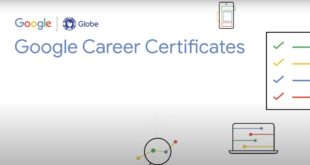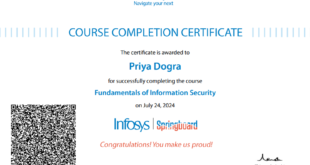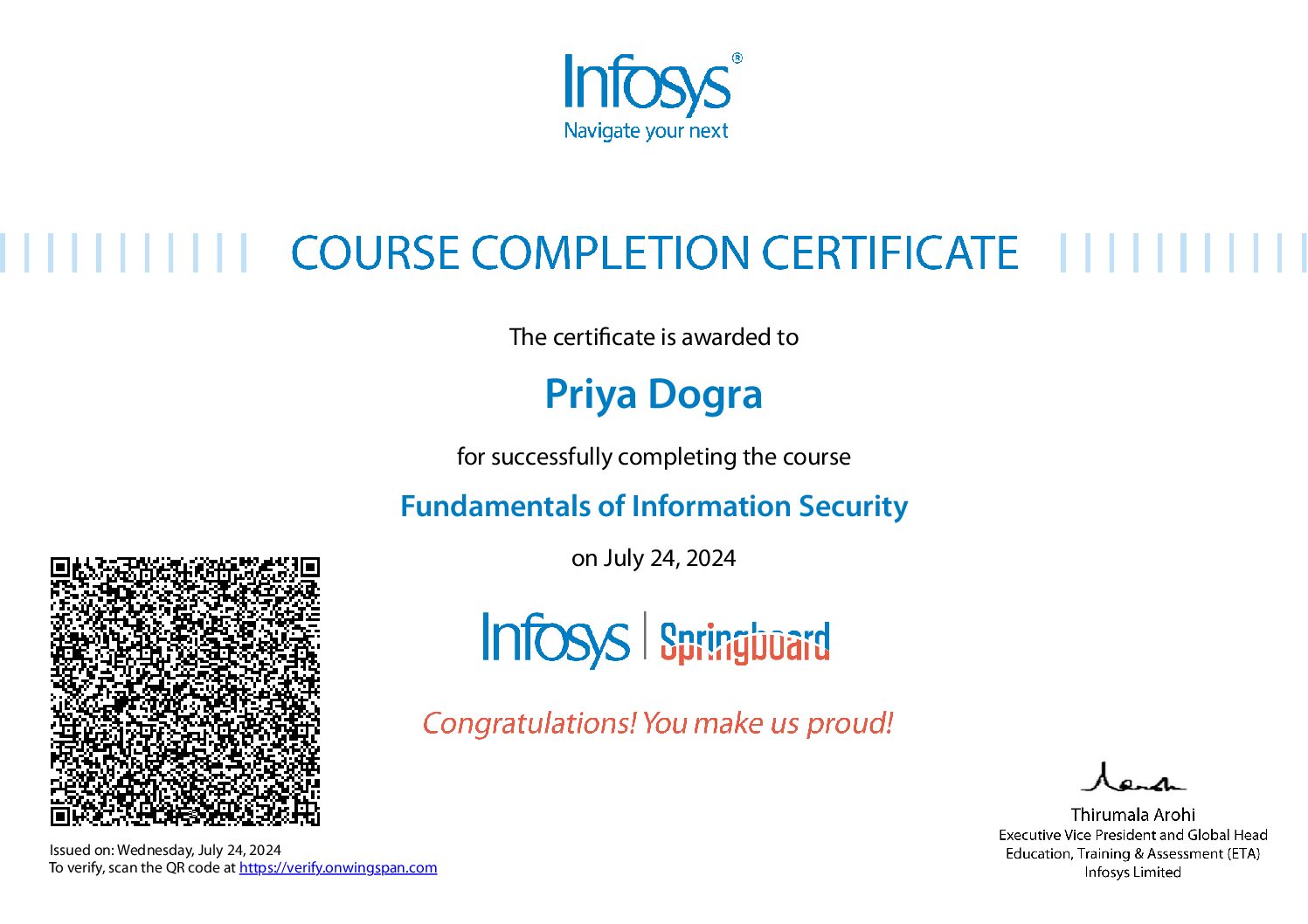Apply Now: Remote Work Professional Certification Ceriprof
Learning Objectives:
To provide globally accepted practices, general support methodologies, tools, techniques, experience and knowledge transfer by the facilitator during the development of the “Remote Work and Virtual Collaboration Certificate (RWVCPC)”
To achieve personal recognition with a professional certification from CertiProf® that seeks to support the necessary and growing form of work.
Target Audience:
– This certification is appropriate for all those interested in acquiring tools and techniques to prepare for the growing need of remote or distance work.
– Anyone interested in validating their professional knowledge and skills as a remote or distance worker.
Prerequisites:
There are no prerequisites for this certification.
Certification Evaluation:
- Format: Multiple choice
- Questions: 40
- Language: English/Spanish
- Pass Score: 24/40 or 60%
- Duration: 60 minutes Maximum
- Delivery: This examination is available Online
Make Sure you Subscribe to My Youtube Channel,Join my telegram channel and WhatsApp group
Question 1: Which of the following is a key teleworking skill desired?
- Ability to talk on the phone.
- Effective time management skills.
- Organized work practices.
- Both B and C.
Question 2: Define what is Remote Working?
- Taking your tasks or pending from the office to finish at home and have them ready for the morning.
- The provision of services to third parties is carried out from any location and not in the organization’s own facilities.
- When, due to illness, you cannot go to the facilities or office and you work from home.
- Offering your services from home because there is a lot of traffic.
Question 3: The development of a structured work plan includes”____
- Ensure that employees know what is expected of them during teleworking.
- That there is an opportunity to train and develop an employee.
- Can be used to evaluate performance.
- All of the above.
Question 4: Teleworking can be a challenge for some people because:
- Reduces the need for communication.
- It blocks career advancement.
- Increases performance expectations.
- Requires the ability to work alone.
Question 5: Jasper is considering working from home. However, he is concerned about some of the myths he has heard. What is a common myth about remote workers?
- You will be more of a team player.
- You will have flexible working hours.
- No opportunity for professional growth./
- Your productivity will increase.
Question 6: When preparing your homework area, work with the following staff:
- Immediate supervisor.
- Agency Telework Coordinator.
- Office of Information Technology.
- All of the above.
Question 7: Which of the following is NOT a remote team facilitation practice.
- Begin the meeting by having everyone speak (icebreaker).
- Meeting materials should be sent out prior to the meeting.
- Work on other tasks (such as checking email) during the Virtual meeting.
- Get there a little early and try out your equipment.
Question 8: Which of the following is a desired teleworking skill?
- Prefer to work without any management supervision.
- Ability to work independently.
- There are no personal circumstances affecting telework.
- Concerned about career and promotion.
Question 9: Which of the following is the responsibility of a teleworking employee?
- Establish a functional workspace at home.
- Be flexible in working hours.
- Setting new performance targets.
- Both A and B.
Question 10: Which of the following statements is true about the benefits of teleworking?
- Gives more flexibility to managers, but not to employees.
- Provides managers with less responsibility.
- Accommodates people with disabilities when opportunities are available.
- Gives more flexibility to employees, but not to managers.
Question 11: The ability to telework means:
- proven teleworking system
- Standard equipment and connectivity.
- Current provisions on telework.
- Both A and C.
Question 12: Which of the following points should be included in a telework proposal?
- Why do you want to telework.
- Proposed location for teleworking.
- Number of days you can telework.
- All of the above.
Question 13: The following is a responsibility of a remote office manager.
- Facilitate weekly team meetings.
- Schedule periodic reviews of the team agreement.
- Facilitate retrospectives focusing on how we can improve as team.
- Maintain Support Systems disclosed, updated, and operating.
- All the above.
Question 14: All the following are important to consider when establishing a home office EXCEPT:
- Having a dedicated room or part of a room.
- Secure sensitive/confidential materials.
- Have ample illumination.
- Allow limited food/drink near the equipment.
Question 15: Select all items in the list that are “success factors” for managing teleworkers.
- Managers distribute work and assign projects based on how often an employee is present in the office…
- Managers are comfortable with policies and legislation related to teleworking…
- Managers set different performance standards and work requirements for teleworkers and employees at the site.
- Managers and teleworkers take steps to ensure that telework works for everyone, to ensure seamless coverage of responsibilities.
- Managers do not provide feedback to employees who telework.
- Telework agreements must be in writing.
Question 16: Natalie is working from home on a project. To make sure she is aligned with her team and her manager, what step should she take first?
- Know the communication styles of your teammates.
- Have clearly defined objectives and milestones.
- Follow up on their tasks.
- Know who your stakeholders are, as they are responsible for setting goals and expectations clear.
Question 17: What do you consider not to be important challenges to consider for a Remote Worker?
- Indicators for measuring work efficiency.
- Meetings to communicate progress and coordination.
- Innovation and agility.
- Develop our self-esteem.
- None of the above.
Question 18: The acronym VUCA was created by the U.S. Army War College to describe the world situation that has emerged after the end of the Cold War and like the one generated by Covid-19 means.
- Vulnerability, uncertainty, complexity, and ambiguity.
- Volatility, uncertainty, complexity, and ambiguity.
- Vulnerability, unfeasibility, complexity, and arbitrariness.
- Volatility, uncertainty, complexity, and arbitrariness.
- None of the above.
Question 19: Which of the following is an important performance management guideline to be applied?
- Do not put any limitations on feedback – state everything.
- Give a negative response first.
- Give feedback when appropriate without considering the timing of the feedback.
- Praise in public, criticize in private.
Question 20: The key factor in trust between an employee and a manager is:
- Maintain a different level of confidence than employees who do not work remotely.
- Having to closely monitor assignments daily.
- Simply trust your employee.
- Look at past performance showing that teleworking is possible.
Question 21: All the following will earn your manager’s trust EXCEPT:
- Volunteering for new projects.
- Completing tasks on time.
- Do your job better.
- Working more independently than as a team member.
Question 22: All of the following elements are important parts of a communication plan EXCEPT:
- E-mail.
- Voice mail.
- Conference calls.
- Meetings outside the company that a teleworker would attend in person.
Question 23: All the following are benefits of teleworking EXCEPT:
- Reduces travel time for participants./
- Improves performance and productivity.
- Has a positive impact on the environment.
- Allows employees to care for small children without childcare.
Question 24: Choose which expression best fits the phrase “A telework agreement, commitment or contract should be: ______
- Required.
- Introduced between manager, employee and telework coordinator./
- Not Mandatory or Inclusive.
- All of the above.
Question 25: Managing for results through performance management includes several operations, including___
- Specify achievable work objectives.
- Focus on processes.
- Reviewing performance and giving feedback.
- Both A and C.
Question 26: All of the following are reminders about telework agreements EXCEPT:
- May be limited in time./
- Can be modified as needed.
- Adapted to the individual.
- Should not be cancelled except in rare situations.
Question 27: All communication becomes easier if you have a strong relationship with people. This is especially true and more challenging for remote workers. What approach would help you establish a relationship with your remote co-workers?
- Meet in the cafeteria at least three times a week.
- Ask what people do and how they spend their time away from work.
- Talk about work all day.
- Ask for help.
Question 28: What makes a telework agreement successful?
Select all statements that are success factors for teleworking.
- Managers and employees do not establish common standards and protocols for communicating with teleworkers.
- Managers and teleworkers define the details of the telework agreement in advance and review them as often as necessary. Telework agreements must be in writing.
- Managers and teleworkers take steps to ensure that telework works for clients, co-workers, and other key personnel to ensure seamless coverage of work-related responsibilities.
- Managers do not monitor employee performance or provide objective information to employees who telework.
Select all the items in the list that are examples of teleworking.
- Site audits.
- Site inspections.
- Working from an alternative work site.
- Investigations.
- Working from home.
- Property management.
- ork performed while traveling to work, traveling between work sites, or on temporary duty (TDY)
Question 29: It is a tool for building remote teams.
- Chats / bots.
- Kudos / acknowledgements.
- Management of traditional projects.
- Agile project management.
Question 30: Which of the following is a success factor for teleworking?
- Request a written communication in most circumstances.
- Create more work for office staff.
- Defining telework arrangements early.
- Use any available technology./
Question 31: One way to overcome the barriers to teleworking is:
- Do not request impromptu meetings.
- Be firm about the time/date of any meeting.
- Schedule meetings at the same time/day.
- Making the scheduling of meetings more flexible.
Question 32: When measuring productivity, you:
- Set specific objectives for your employees.
- Judging group and individual performances.
- Weighing teleworking and office productivity in the same way.
- All of the above.
Question 33: All the following are tips for creating a telework agreement EXCEPT:
- Create expectation list for all telework tasks.
- Indicate the type of teleworking.
- Summarize the administrative support procedures./
- Be specific with days/hours.
Question 34: Which of the following corresponds to a remote working facilitation practice?
- Work on maintaining morale.
- Analyze efficiency./
- Recognize contributions and achievements.
- Arrive a little early and interact with the team, resolve doubts.
Question 35: If you must say “No” to a telework agreement, make sure it is in place:
- Be honest, open, and fair.
- Reaffirmed its expectations to the employee.
- Reviewed what you have or have not done to solve the problem.
- All of the above.
Question 36: As a teleworker you are responsible for all the following EXCEPT:
- Communicate with the entire team.
- Obtaining the necessary software.
- Understand learning technology procedures and guidelines.
- Determining goals, work plans and schedules.
Question 37: What are the motivators for doing Remote Working (Teleworking)?
- Productivity and number of work hours.
- Company culture.
- Comradeship and trust.
- Being your own boss.
Question 38: Communication as a key teleworking skill requires all the following EXCEPT:
- Communicate in a way that best suits your work style.
- Speaking clearly and often with everyone.
- Ensure that all participants communicate in the meetings.
- Check with your manager as to how it is defined and the rules of the game.
Question 39: It is a collaboration tool for remote teams:
- Virtual Office.
- Document editing.
- IM.
- Broadcasting.
Question 40: All the following are important when approaching your manager about teleworking EXCEPT:
- Be flexible with your settlement proposal.
- Avoid setting off alarms.
- Think like an employee, not a manager.
- Bring a proposal when you meet.
Question 41: Indicate which of the following are NOT recommended activities for remote team leadership.
- Celebrate failed ideas as learning opportunities. Sandbox.
- Ensure understanding of objectives. Encourage consistency.
- Use visualization.
- Confidence in advancement and use of online visualization tools.
Question 42: All the following are important to consider when establishing a home office EXCEPT:
- Having a dedicated room or part of a room.
- Secure sensitive/confidential materials.
- Allow limited food/drink near the equipment.
- Have ample illumination.
Question 43: All the following are technology considerations EXCEPT:
- Access to the network.
- Communication Requirements.
- Administrative support.
- Hardware and software requirements.
Question 44: The following is a responsibility of a remote office manager.
- Facilitate weekly team meetings.
- Schedule periodic reviews of the team agreement.
- Facilitate retrospectives focusing on how we can improve as team.
- Maintain Support Systems disclosed, updated, and operating.
- All the above.
Question 45: The definition of telework includes:
- Working while traveling to work.
- Working in an approved workplace.
- Visits to a customer/client site.
- Official travel.
Question 46: While telework schedules can offer flexibility; it is important to remember that they should be developed in collaboration between teleworkers, supervisors, and co-workers. What would you say are the main points to consider when creating work schedules?
- Organize schedules for the convenience of the teleworker.
- Encourage flexibility on both sides.
- Planning teleworking schedules such as holiday schedules.
- A and B.
Question 47: There are several ways to avoid distractions in a remote environment. What is the most important factor in doing so?
- Use noise reduction technology.
- Close the door.
- Set boundaries.
- Work in a joint workspace.
Question 48: Sebastian is a remote worker looking for a sense of community in a shared workspace at no cost. What space will help him find a collaborative environment from which he can work remotely?
- A Supermarket.
- The nearest hospital.
- Working from home.
- The cafeteria.
Question 49: Pete’s part of a remote support team. His company uses several tools that allow remote workers to feel more connected and part of the culture. Which tool does Pete use the most?
- Email.
- Screen sharing.
- Instant messaging.
- Phone.
Question 50: All the following are the responsibilities of the manager EXCEPT:
- Allow some employees to work without management supervision.
- Maintain equitable expectations and standards.
- Learn the parameters of you telework policy.
- Be specific to ensure understanding of expectations.
Question 51: Which of the following is NOT a principle of the remote working culture:
- Performance over informality.
- Clarity in Mission.
- Asynchronous (remote) vs. synchronous responses.
- Appreciation always in management
Question 52: The most important aspect of starting any job or project, whether at a distance or on site, is to have clear expectations. Who is responsible for ensuring that expectations are set?
- Your manager
- Your manager’s manager
- You
- The HR Representative
 Priya Dogra – Certification | Jobs | Internships
Priya Dogra – Certification | Jobs | Internships



